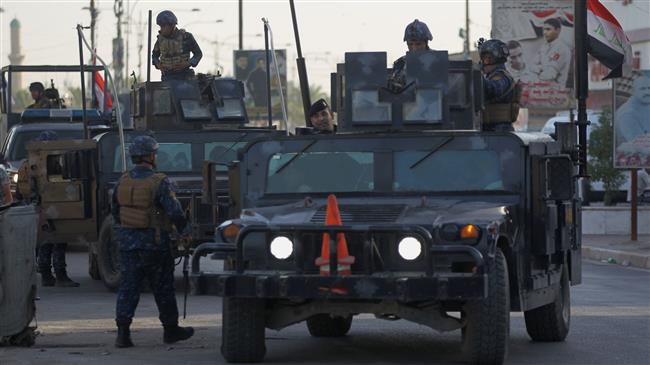
RNA - Colonel Shaker Obeid al-Rishawy told Arabic-language Basnews news agency that the Federal Police Force received a tip-off about the presence of a group of Daesh militants in a desert area south of al-Rutbah town.
“Security forces immediately launched an offensive, killing 14 Daesh terrorists and destroying four of their armored vehicles in the process,” Rishawy noted.
He added that three underground tunnels, which the Takfiris were using to stockpile various kinds of munitions and move freely between areas under their control, were also uncovered and destroyed.
Separately, Iraqi security forces arrested four Daesh militants during an operation in the oil-rich northern province of Kirkuk.
Iraqi Joint Operations Command (JOC) spokesman Brigadier General Yahya Rasool said that the quartet was captured in the Kurdish-populated Panja Ali district of the province.
Rasool added that the detained Daesh militants were wanted on terror charges under the Iraqi Anti-Terrorism Law.
Elsewhere in the central province of Salahuddin, four army soldiers lost their lives and five others sustained injuries in an overnight attack by Daesh militants.
Major Alaa al-Saadi from Diyala Operations Command said fierce clashes erupted late Wednesday when Daesh terrorists attacked an army outpost in the rugged Mutibjah area.
Saadi added that reinforcement troops arrived on Thursday morning, and began an operation to hunt down the assailants.
On June 30, Iraqi Prime Minister Haider al-Abadi, who is also the commander-in-chief of Iraqi forces, pledged to hunt down the remnants of Daesh militants across Iraq after a series of attacks and abductions by the terrorist group.
“We will chase the remaining cells of terrorism in their hideouts and we will kill them, we will chase them everywhere, in the mountains and the desert,” Abadi said.
According to Press TV, Abadi declared the end of military operations against Daesh in the Arab country on December 9, 2017.
On July 10 that year, the Iraqi prime minister had formally declared victory over Daesh extremists in Mosul, which served as the terrorists’ main urban stronghold in the conflict-ridden Arab country.
In the run-up to Mosul's liberation, Iraqi army soldiers and volunteer Hashd al-Sha’abi fighters had made sweeping gains against Daesh.
The Iraqi forces took control of eastern Mosul in January 2017 after 100 days of fighting, and launched the battle in the west on February 19 last year.
Daesh began a terror campaign in Iraq in 2014, overrunning vast swathes in lightning attacks.
847/940